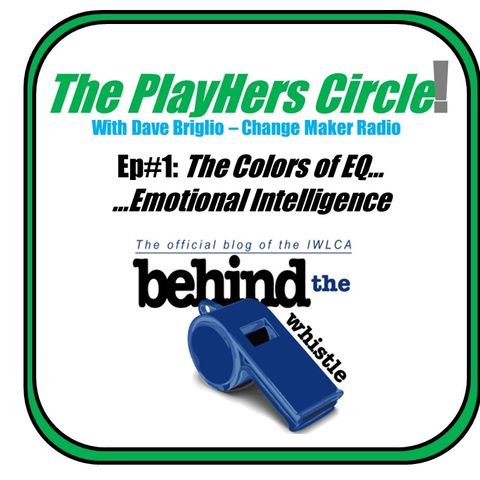TPC#1 - The colors of EQ

Download and listen anywhere
Download your favorite episodes and enjoy them, wherever you are! Sign up or log in now to access offline listening.
Description
Guests: Dr. Justice is the Founder and CEO of EQmentor Inc. http://www.eqmentor.com/ Lyndsey Boswell, Head Coach, High Point University @hpuwlax Dr. Jen Fraser: https://www.buildbetterbrains.net/ This podcast episode was inspired by...
show moreDr. Justice is the Founder and CEO of EQmentor Inc. http://www.eqmentor.com/
Lyndsey Boswell, Head Coach, High Point University @hpuwlax
Dr. Jen Fraser: https://www.buildbetterbrains.net/
This podcast episode was inspired by the IWLCA blog, Behind The Whistle: https://iwlca.wordpress.com/
By Lyndsey Boswell, Head Coach, High Point University @hpuwlax
Emotional Intelligence (EQ) is our ability to identify what we are feeling, why we are feeling it, how our feelings affect our physical performance and of those around us. The ability to actively change emotions during competition presents a significant competitive advantage. I have a team and coaching staff that has benefited greatly from investing time in learning about emotional intelligence and using their new language in our daily practice. When I say daily practice, I am referring to lacrosse, but more importantly, life. I have learned through my own experiences with emotional intelligence, that instead of teaching drills, and extending practice two extra hours for conceptual X’s and O’s, to spend that time training the mind, and using an EQ language that puts my players’ minds (thoughts and emotions) in a place where they are making great decisions under pressure.
Photo courtesy of High Point Athletic Communications.
Earlier this year, I attempted to motivate a player by talking about her accomplishments before and during game time. I saw great potential in this athlete, but she was not performing to her potential, not because she was not capable physically, but because she had a mental block. This player was crushing practice, doing all the right things off the field and in the weight room, but when it came to game-time, she couldn’t perform the way we knew she could. I used an old school way to try to motivate her with statistics, and playing time, and it did not work.
We then sat down and chose a holistic approach instead of physically drilling her for weeks on the things we knew she was already capable of. Through our emotional intelligence training, and using our EQ language, she committed to a more mindful way of training. Rather than focus on the outcome, or the metrics, we chose to send her senses to focus on very small stimuli on the field during game time, something called “micro-focus,” and using all the abundant sights and sound stimuli to be present in a single moment, and not mind-wander. It is based on the neuroscience (EQ) principle that a conscious effort to think about one thing is a subconscious thought to not think about another. This allows the brain to make the best possible decision in critical situations. The outcome for this specific student-athlete is that she now plays with no fear of mistakes, she has fun, she is contributing like never before and reaching her full potential; not because of her skills, but because of her mental toughness. Her weakness has become her strength.
We no longer focus on outcomes, instead we set an expectation every game to be at our best. We set a high standard of being mindful. Instead of throwing out clichés that dilute our messages, we use very specific micro and macro focuses, to anticipate, and stay in the moment.
We now have a framework, and a language. My team knows how to read each other’s emotional temperature and change it in the moment to get themselves and each other “green” – that emotional state of being fully present, in a zone. When my team is emotionally green – we make great decisions, and we have fun. It’s the daily practice for life – not just lacrosse. While X’s & O’s are a huge part of our daily practice, about half of what we do is emotional and mental work to increase our ability to be at our best. We learned all this from EQ Master Coach, Dr. Izzy Justice. It is my daily goal in life to show these young women that they are the STAR of their lives, and it is their job to make the best decisions for themselves for pure happiness – not just on the field, but in life!
Information
| Author | Making The Play Radio |
| Organization | Change Maker Radio |
| Website | - |
| Tags |
Copyright 2024 - Spreaker Inc. an iHeartMedia Company

Comments